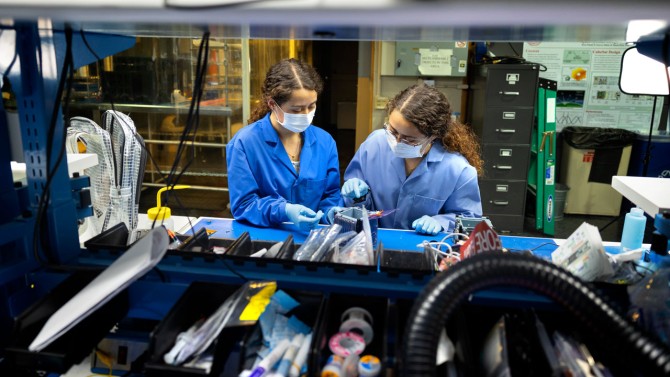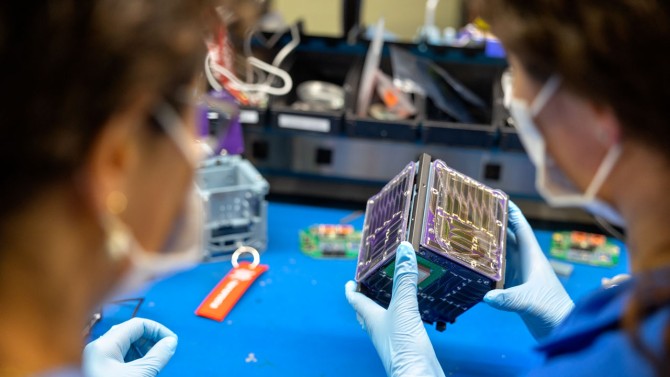Identical twins Ashley and Verena Padres '26 were 10 years old and already obsessed with space exploration when they joined a competition to design and launch a rocket made from a 2-liter soda bottle. The grand prize was a chance to see a real rocket launch.
"We were determined to win," Verena said.
Ashley worked on balsa wood fins and Verena on a small parachute that the girls tested by throwing all over their yard in La Verne, California, a Los Angeles suburb a half-hour drive from NASA's Jet Propulsion Laboratory and an hour from SpaceX's headquarters.
Twin sisters and mechanical engineering majors Verena (left) and Ashley Padres, both class of 2026, fell in love with the idea of space exploration and working together at an early age.
The sisters, now mechanical engineering majors in Cornell Engineering, didn't win that first competition, but they remember it fondly as one of the first times they worked together on an engineering problem.
"It was so fun," Verena said. "And it was the start of the spirit of collaboration that we're still seeing now, where working together has been very beneficial. I know how she thinks, and she knows how I think, and we're able to take advantage of that to really work together efficiently."
The twins' approach is now in use in multiple aerospace projects at Cornell and beyond: Verena is leading a team in Cornell's Space Systems Design Studio to send a light sail deployer laden with sensors for testing on the International Space Station; and Ashley's work with Cornell University Unmanned Air Systems (CUAir), one of Cornell Engineering's project teams, has led to breakthroughs in the design of an unmanned aerial search and rescue plane. Last summer, while Verena interned at NASA's Jet Propulsion Laboratory, Ashley led a group in developing a mission to detect and characterize exoplanets through Cornell's SmallSat Mission Design School. Both sisters will intern at SpaceX in summer 2024.
After working together for years, the sisters said Cornell's collaborative environment was a huge draw.
"Cornell really encourages you to work with your peers, and with that, students can create and pursue things that haven't been done before, just out of their sheer will to do something cool," Ashley said. "As students, we can have a hand in actual engineering and designing, testing and manufacturing. Verena and I now have this opportunity to see what we're really interested in, to pursue the best opportunities to grow as engineers and to learn as much as we can."
Everything together
The twins found their passion early - Verena became obsessed with space in elementary school, after reading a book about female astronauts. Ashley was hooked after watching a pair of SpaceX's Falcon 9 rockets return from a mission.
"It all started there," Ashley said. "It was this impossible idea of sending something into space but at the same time bringing the launch vehicle back and making it sustainable. The whole idea of going to the stars was amazing to me. It still is."
The twins advanced quickly from bottle rockets. In high school, they joined their local Civil Air Patrol, an auxiliary of the U.S. Air Force, and participated in the American Rocketry Challenge, where they built and launched model rockets with fragile cargo: an egg that had to stay intact for the flight and landing. They competed in the national finals twice. Their interest in space was also supported and bolstered by their parents - both civil engineers who encouraged them to explore their scientific curiosity from an early age - and their proximity to NASA and SpaceX.
Throughout their early lives, Verena and Ashley found their unique ability to communicate facilitated their learning and made it easier to take risks.
"We understand how to convey to each other the information we need for some concept to click," Verena said. "And I feel like I wouldn't have gotten to where I am, or to Cornell, if it wasn't for us doing so many things together. Having my best friend with me allowed us to step outside our comfort zone."
The twins both graduated from high school in three years and knew they wanted to attend college together; when they were accepted at Cornell - one of only two schools they applied to outside of California - their support for one another made moving almost 3,000 miles away from their family feel possible.
"We can rely on each other for ideas and insights but also just for support even if it's not a technical challenge," Ashley said. "I can be there to support her and vice versa, in engineering and as a friend."
Finding themselves
The sisters were also attracted to Cornell because of the breadth of opportunities - they saw numerous ways to engage in aerospace engineering and research and were eager to explore.
"It's a fresh slate," Ashley said. "I get to really ask: Who do I want to be as an engineer? What do I want to pursue?"
The Padres sisters examine Alpha CubeSat (a light sail-carrying, cube-shaped satellite) in the Space Systems Design Studio Lab in Rhodes Hall.
This exploration has set the twins on different but related paths, with Verena pursuing research in the Space Systems Design Studio, led by Mason Peck, the Stephen J. Fujikawa '77 Professor of Astronautical Engineering, and Ashley choosing to work on the student-led CUAir project team. Verena hopes to pursue a Ph.D. and advance human and robotic exploration of our solar system, while Ashley is interested in focusing on the vehicles that make that exploration possible.
Still, the sisters are study partners for their classes and serve as essential sounding boards for each other's projects, often returning to their shared dorm room at night to debrief the day's challenges and celebrate the successes.
"I would finish my flight shift, and she would come back after a whole day of test-flying her plane, and it's like: 'you won't believe what happened today,' or, 'we finally finished this,' or, 'we thought something was broken and panicked but fixed it,'" Verena said. "Just having someone that I can share my excitement with has been amazing."
The sisters have found a broader community at Cornell as well, with their suitemates and through the Cornell chapter of Women of Aerospace and Aeronautics, a student group founded in 2020, that provides professional development and networking for female students interested in careers in aerospace and aeronautics, a field where gender parity is lacking. The twins said the group has the same spirit of collaboration they have shared and that they value at Cornell.
"All these opportunities make us feel like we're not alone in what we're doing," Ashley said. "We're a part of this much bigger group, where everyone is working together and rooting for you. It's not competitive at all but, like: Let's all bring each other up. Let's all get there together."








